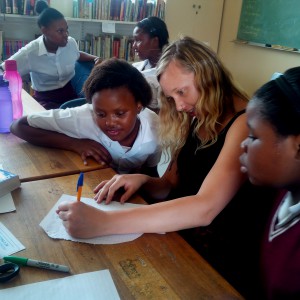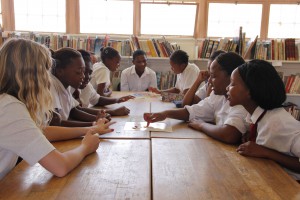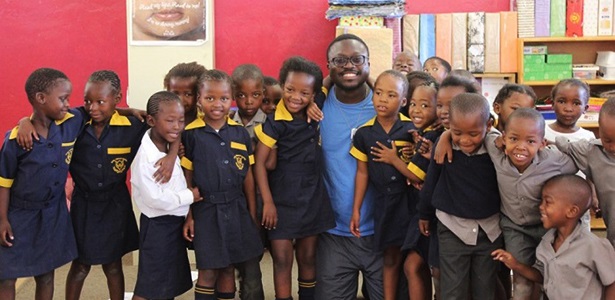
Samantha Kay Kobs. 2014-2015, Fulbright English Teaching Assistant to South Africa, works with students in an after school English club that she and Fulbright partner Meia Geddes created at their school in Bloemfontein, South Africa. These games, provided by the Office of English Language Programs, help students improve their English speaking skills by prompting them to answer a variety of questions about themselves and the world around them (Photo Credit: Meia Geddes, 2015 Fulbright English Teaching Assistant placed here with me in Bloemfontein, South Africa).
The bell rings. Moments later, I hear the shuffling of 1,300 pairs of shoes as I brace myself for yet another lunch break spent working in the library; our library—the one at Dr. Blok Secondary School in Bloemfontein, South Africa. The one that my Fulbright English Teaching Assistantship (ETA) partner and I just reopened after six years of being locked up behind giant iron bars.
As a Fulbright English Teaching Assistant in South Africa, I’ve had many responsibilities: helping teachers, creating after school clubs, and reaching out to businesses for sponsorships. I’ve also spent plenty of time reestablishing the school library that was seemingly forgotten. Abandoned. Thousands of books—mostly outdated, torn covers, and enough dust to cause some serious asthma attacks—had to be cleaned and organized in a logical manner. Then came teaching my students the absolute basics of library etiquette. This has been exasperating to say the least, but I often remind myself that my students do not mean to disorganize with their frantic book grabbing—they are simply enjoying the privileges of a library for the first time in their lives. Challenges aside, I love what I do, but sometimes it’s difficult to see the impact that you’re having when you’re so caught up in the busyness of it all.

Samantha Kay Kobs, 2014-2015, Fulbright English Teaching Assistant to South Africa, working with learners on a creative writing task during an English Club meeting after school. The English Club provides a safe space for students to improve their English reading, writing, speaking and listening skills by participating in a variety of activities such as skits, debates, and art projects (Photo Credit: Meia Geddess, Fulbright English Teaching Assistant 2015 placed in Bloemfontein, South Africa).
Lately, I’ve been contemplating the concept of time. In school, I used to watch the second hand tick-tick-tick around the clock during class, or hear it as I’d fall asleep at night. But recently, I experienced a different kind of clock—the kind with a second hand of smooth transition, the kind that slips around the clock’s edges as if it’s on ice skates. As if time is liquid. And there was something strangely terrifying about it; I felt I had less control. When a second hand ticks, there’s a brief moment of stillness between each second, and that stillness creates a sense of control or perhaps the feeling of having more time. But when time runs smoothly, skating across that icy surface, its countdown feels persistent, and real.
My advice to future applicants is simple: recognize that time is liquid—liquid gold—and it slips through our fingertips all too quickly. Do not hesitate to put your passions into action; you never know who may benefit. Equally as important is this: As Fulbright ETAs, we are not just teachers, but we are also learners. The willingness to listen as much as we speak and to learn as much as we teach is what makes this program such a reciprocal experience, thus helping to reach the program’s goal of increasing mutual understanding amongst nations.
As a part of the Fulbright Program, you will be offered unlimited opportunities to impact individuals, communities, organizations and entire countries. But remember, every interaction you experience is an opportunity for you to grow, too. Remain active; despite what your clock might suggest, there are no brief moments of stillness to be passive with your passions.


4 Comments
Wonderfully wtitten Sam and the title is beautiful!! So so proud of you!
SAMANTHA WHAT YOU DID AT OUR SCHOOL U AND MEIA WAS AWESOME AND THOUGHTFUL OF US SOUTH AFRICANS U GUYS HAVE CREATED OPPORTUNITIS FOR US THAT WE DIDNT HAVE ACCESS TO…I THANK U VERY MUCH FOR ALL YOR EFFORT YOU HAVE PUT IN
SAMANTHA I STILL WISH BEING AT AMERICA ONE DAY TO STUDY THERE…I’LL DO MY ATMOST BEST TO GET THERE IN 2017 TO STUDY FUTGHER AT BROWN UNIVERSITY
Wow Sam, impeccably written! I really aspire to a diligent writer like youself. I believe will inherit your creativity all in good time ,for you have left us a plethora of useful creative writing skills. SA is not the same without you . Thanks for everything.